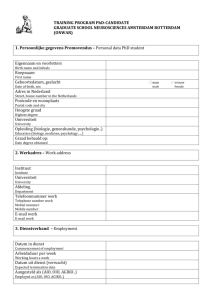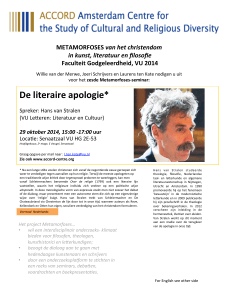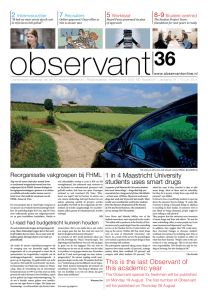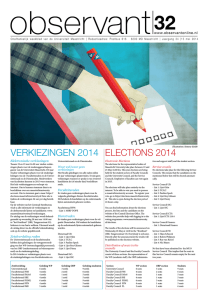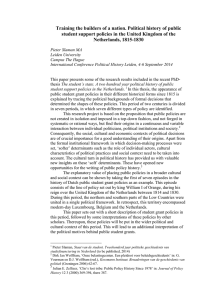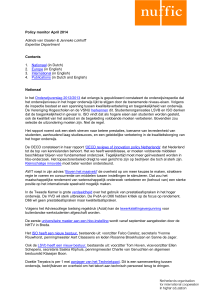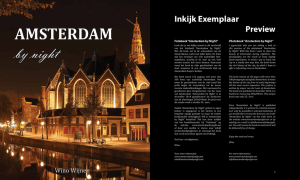Research Master Classical, Medieval and Renaissance Studies
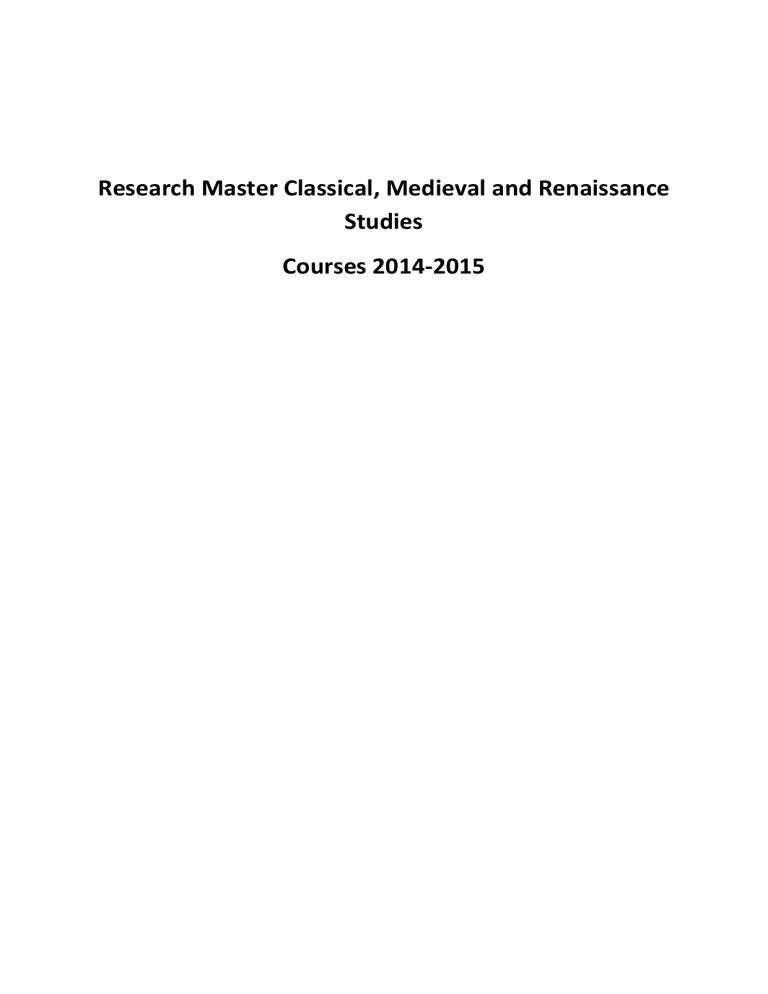
Research Master Classical, Medieval and Renaissance
Studies
Courses 2014-2015
Contents
Compulsory courses ................................................................................................................................ 4
Approaches of Antiquity, Middle Ages and Early Modern Times, LQR006M10, S1 ............................ 4
CMRS – Seminar, LQR001M10, S2 ....................................................................................................... 4
Elective courses ....................................................................................................................................... 4
Medieval Latin I, LMX001X10, S1 ........................................................................................................ 4
Script, Manuscript and Print in Middle Ages and Renaissance I, LMX007X10, S1 .............................. 4
Script, Manuscript and Print in Middle Ages and Renaissance II, LMX009M10, S1 en S2 .................. 5
Medieval Latin II, LMX002X10, S2 ....................................................................................................... 5
Interdisciplinary courses.......................................................................................................................... 5
Letter-writing in premodern Europe, LLS035M10, S2 ......................................................................... 5
Elective courses: Literature ..................................................................................................................... 5
Dialogue in French literature, LRF036M10, S1 .................................................................................... 5
Drama in Medieval England, LLE009M05, S1A .................................................................................... 6
Anglo-Saxon Saint’s Lives, LLE010M05, S1A ........................................................................................ 6
The Premodern City: London & Writers, LLE003M0, S1B5 ................................................................. 6
Processing the past, LNX018M10, S1 .................................................................................................. 7
Elective courses: History ......................................................................................................................... 7
Res. Sem.: Bonfire and Bells, LGX157M10, S1 ..................................................................................... 7
Res. Sem.: The Living Archive, LGX165M10, S1 ................................................................................... 7
Elective courses: Classics and Ancient Civilizations ................................................................................. 7
Res.Sem.: "Late Antiquity", LGX146M10, S1 ....................................................................................... 8
Res.Sem.:Cultures of Memory in Antiquity, LGX147M10, S2.............................................................. 8
Commentaries Greek and Latin Texts, LQX020M10, S1 ...................................................................... 8
The Rise of Cities and States, LPM005M10, S1 ................................................................................... 8
Greek Epigraphy, LQX021M05, S1 ....................................................................................................... 9
Greek Epigraphy: Essay, LQX022M05, S1 ............................................................................................ 9
Greek Literary Papyrology, LQX026M05, S1B ..................................................................................... 9
Theme Greek and Latin, LQX027M10, S2 ............................................................................................ 9
The Archaeology of Death: The Mycenaean World, LPX006M10, S2 ................................................. 9
Elective courses: Religion and Religious Studies ..................................................................................... 9
Medieval Mysticism, Kabbalah and Contemporary Culture, THMMKCCE10, S1 ................................ 9
Jews Christians Muslims, THMJCME10, S1 ........................................................................................ 10
Knowledge, Secrecy, and Revelation in Antiquity, THMKSRAE10, S1A ............................................. 10
Masterlanguage: an interesting addition to your master programme ................................................. 11 http://masterlanguage.nl/cursusaanbod/cursusaanbod-2014-2015/ ................................................. 11
Griekse epigrafie, S1 .......................................................................................................................... 11
Patristiek (Vroegchristelijke Literatuur) Saints and sinners: rolmodellen in de vroegchristelijke literatuur, S1 ...................................................................................................................................... 12
Latijnse epigrafie, S2.......................................................................................................................... 12
Papyrologie, S2 .................................................................................................................................. 13
Shakespeare across Borders, S1 ........................................................................................................ 13
Old School Information Technology, S1 ............................................................................................ 14
Medieval English Manuscripts as Networks for Practical Science .................................................... 14
I classici italiani in traduzione, S1 ...................................................................................................... 14
Il Bel Paese: identità italiana e culto della bellezza, S2 ..................................................................... 15
Descrizione del corso ......................................................................................................................... 15
National Research School Courses ........................................................................................................ 15
The Approaches and CMRS Seminar courses are compulsory for all students.
In addition to the two compulsory courses you will choose four research courses (or 40 ECTS) in your chosen area of specialization in consultation with the director of studies. You will have the opportunity to choose courses from the offerings of the many departments that contribute to this
Research Master. In this booklet you will find possible options. For more information about the courses see Ocasys ( https://www.rug.nl/ocasys/ ).
Compulsory courses
Approaches of Antiquity, Middle Ages and Early Modern Times, LQR006M10, S1
Scholarly research is often determined and defined by contemporary ideas, theories, research questions, and methods. It follows that every research outcome is also a product of its time and context. A researcher must therefore take his or her own setting into consideration. In this course students analyse and evaluate various forms of academic output (including articles, monographs, studies, translations, editions, commentaries, and other publications) to arrive at a deeper understanding of underlying theories and approaches. Students will apply scholarly criteria to evaluate the value of academic publications for their own research.
CMRS – Seminar, LQR001M10, S2
A module in which students prepare a small-scale conference. The students choose and prepare the subject content, compile the programme and give a presentation. Draft papers are read and discussed during the tutorials. Each paper at the conference will have one student speaker. To ensure that the conference elements form a coherent whole, the students must choose a subject that is relevant to all areas within the CMRS discipline and offers a point of departure for methodological discussion and development. At the same time, the subject must relate as closely as possible to the students' specializations.
Elective courses
Medieval Latin I, LMX001X10, S1
Knowledge of Latin is highly important for students of the Middle Ages and the Renaissance. This module teaches Medieval Latin to students who have little or no previous knowledge of Latin. This module is combined with Medieval Latin for Advanced Students. Each group will be taught at its own level. The aim is to teach students to read Medieval Latin sources at consultation level. Texts from the entire period will be used.
Script, Manuscript and Print in Middle Ages and Renaissance I, LMX007X10, S1
The module introduces in development, role and use of script, script types, written and printed book in various sectors of the European society from the late Ancient History up to the Renaissance. The study of the material aspects of the written and printed book and history of libraries and archives will be included. The module helps anyone interested in working with primary textual sources from the
Middle Ages and the Renaissance (from a linguistic or literary, historical, archaeological or arthistorical interest) to develop elementary reading skills (in mainly Middle-Dutch texts) and to learn basics of manuscript description. Manuscripts and printed books of the University Library will be showed often in the classes. An introduction in archives is foreseen.
Script, Manuscript and Print in Middle Ages and Renaissance II, LMX009M10, S1 en S2
This advanced module is designed for students who already have some experience in reading old scripts and in description of manuscripts and early printed books (as a follow-up of LMX007X10). This module can incorporate an advanced study in practice and theory of palaeography, diplomacy and textual criticism as well as codicology, analytical bibliography and library history.
Medieval Latin II, LMX002X10, S2
Knowledge of Latin is highly important for students of the Middle Ages and the Renaissance. This module focuses on advanced students, i.e. students who had Latin as one of their examination subjects at secondary school. This module is combined with Medieval Latin for Beginners. Each group will be taught at its own level. Advanced students will be presented with the same subject matter, but in a condensed form, and will be given opportunities for further study.
Interdisciplinary courses
Letter-writing in premodern Europe, LLS035M10, S2
The course will explore premodern correspondence as an instrument of cultural exchange and transmission creating “different networks of exchange” with reciprocal effects for members of different strata of premodern society, shaping the ethos of social groups and sharing political, commercial, diplomatic, literary and scientific information and opinions (Bethencourt & -Egmond
2007). Within this framework, a broad corpus of correspondence and correspondents will be analyzed, ranging from scholars to politicians, artists (including poets and ,novelists), merchants and even to illiterate peasants. A variety of media will be studied: traditional letters, but also newsletters and reports that functioned as channels of transmission of correspondence. The course will consist of a series of seminars, centered on the discussion on themes and methodologies of letter and correspondence research, guest lectures and an excursion to libraries with relevant letter collections
(e.g. Leiden and The Hague).
Elective courses: Literature
Dialogue in French literature, LRF036M10, S1
In this seminar we will study form and content of the literary dialogue in older and early modern
French literature. We will examine which motives besides the communicative one are at the bottom of the dialogues. Esthetic, political, didactic, parodic reasons? What kind of language and stylistic registers are used? Regarding the early modern period we will explore the ‘enligthtened’ dialogues by Diderot (Jacques le Fataliste, Ceci n’est pas un conte, and Le neveu de Rameau). The texts to be studied from the older period will be announced not later than the beginning of August.
Engels, courses of 5 ECTS
The Others: Outsiders and Malcontents, LEX011M05, S1A
This course looks at the ‘outgroups’ of early modern England. Some of these were mundane, and included ordinary people from everyday life who, because of their gender, sexuality, religious beliefs or criminality were barred from certain kinds of social influence. Other groups were more exotic: foreigners, witches, Jews and black people were known to exist in England, but for the majority of people they lived more in their imagination than in their realities. There were also vilified individuals such as Shakespeare’s hunch-backed Richard III and the malcontents of revenge tragedy who
stabbed, poisoned and raped their way through the corrupt social fabric they found themselves in.
While all of these categories of people were marginalised (often by using shared strategies), the effects of this were very different: writers had a licence to experiment that placed them in a special relationship to their society and this course looks at the complex ways that social and fictional worlds interacted. See http://jfloodgroningen.wordpress.com/ma/
Drama in Medieval England, LLE009M05, S1A
In English literature there is a long and fruitful drama tradition, which originated in the late Middle
Ages. Born out of the wish to teach, drama soon became a source of entertainment, in which humour, satire, emotion and language were important ingredients of an unfolding literary tradition.
They experimented widely with screaming devils and bossy women, devotion and slapstick, biblical and secular themes, small stages and grand performances. In this course we will read a number of representative plays from the fifteenth and early sixteenth centuries, and pay particular attention to the literary and cultural backgrounds, as well as the staging. In addition, we will stage a number of scenes in each class.
Anglo-Saxon Saint’s Lives, LLE010M05, S1A
Saint’s lives belonged to the absolute best sellers of the early Middle Ages and constitute one of the sources of the narrative tradition in English literature. In these stories all of life features: princes, perverts, prostitutes, thieves, murderers, beautiful women, dragon slayers, wise men and fools, the young and the old, Christians and pagans. The tradition of saint’s lives and the ways in which these lives were adapted and applied in Anglo-Saxon England forms the theme of this module. We will read a number of saint’s lives and related texts from the Anglo-Saxon tradition, with special attention to what these lives can tell us about the literary culture of the Anglo-Saxons. In addition, we will be concerned with hagiography as a discipline and become acquainted with the tools which researchers have at their disposal for studying this fascinating tradition.
The Premodern City: London & Writers, LLE003M0, S1B5
Sandwiched between our notions of what constitutes ‘medieval’ and ‘early modern’, fifteenth- and early sixteenth-century literature continues to resist easy. Yet the years between 1400 and 1530
(presided over by no less than ten Kings of England) witnessed some of the most spectacular turns in
England’s political fortunes. As more and more of the country’s public and cultural life was taking place in London, the city began to emerge as a facilitator of such overlapping discourses as politics, law, literature, or theology.
WEM
WEM 3: From Manuscript to Printed Book, LEO015M10, S1
In the relation between hand-written (Medieval) English texts and modern audiences, text editors and translators are all-important. They determine how a text is transmitted to an audience: in the original language or in translation; in a scholarly edition or as a story book. Only rarely do we get a glimpse of the original version(s). In this course we will monitor closely aspects from the process of text editing from manuscript to printed book, with a strong emphasis on the interpretation of written sources in the English language. What kinds of information can we derive from the pages of a manuscript or early printed book, and how do we render this information suitable for publication in modern media, varying from classical books to modern websites. What are the underlying theoretical
constraints? What is the role of the internet in modern editing? This module will prepare students for
WEM 4, in which an edition will actually be made.
Dutch
Processing the past, LNX018M10, S1
The course will explore the functioning of early modern Dutch literary texts about (natural) disasters: floods, fires, explosions, earthquakes and epidemics. Conceptual frameworks and research questions will be based on the fields of cultural memory studies and historical research on crisis and disasters.
Elective courses: History
Res. Sem.: Bonfire and Bells, LGX157M10, S1
Complete title: Bonfires and Bells: Means and Media of public solidarity in early modern society
“The business of government is the act of securing compliance” (Kevin Sharpe). This course looks at the means and media used by early modern authorities to generate and foster public support. A series of celebrated moments and their representation in commemorative media such as historiography, festivals and architecture will be examined to shed light on the relationship between rulers and ruled. Case studies will cover early modern England and the Dutch Republic thus allowing comparisons between different political systems and the strategies of their elites to secure their leadership in turbulent times.
The seminar will be given in English
Res. Sem.: The Living Archive, LGX165M10, S1
Archives are no longer the traditional cultural heritage institutions they used to be after the internet exploded and thousands of websites that represent official and unofficial archives – like YouTube – were established. User-generated content, large-scale digitization of archival collections and so on, force us to redefine our concepts of what an archive should or could be. This development offers many new opportunities for contemporary historical research which can only be fruitful if we develop more insight in the characteristics of this immense digital archive that does not have an established hierarchy and lacks the official guidance by an archivist or catalogue. According to the
German scholar Wolfgang Ernst new practices in keeping, sharing and re-using material have ended the traditional “read-only paradigm”. The digital archive is above all a “living archive”, that is: unstable and very dynamic. During the course we will explore the different concepts of digital archives and the challenges it brings with regards to our traditional historical methods, like: To what extent do digital archives ask us to re-evaluate the value of archival collections? How can we develop new research questions and new strategies for analysis in an age when historians no longer have to deal with scarcity but with abundance? These questions and more will be explored in an interactive way, combining a theoretical and problem/solve approach. NB. The main focus during the course will be on audiovisual archival collections.
Elective courses: Classics and Ancient Civilizations
Res.Sem.: "Late Antiquity", LGX146M10, S1
In this course the focus is on a period which generally does not get much attention in our curriculum: the fourth to eighth centuries. These centuries which have for a long time been chararterized as a timespan of decline and fall, have received considerable attention from historians in the last decades. Some historians have focused on the great changes in these centuries, others have emphasized the continuity. In this course the various approaches to these centuries will be studied and discussed.
Students will learn how to critically read and interpret the avalaible source material and the existing secundary literature in order to formulate their own perspective on the historical developments in these centuries.
Res.Sem.:Cultures of Memory in Antiquity, LGX147M10, S2
Ancient memory cultures are a fascinating topic. Alongside the literary historiography (a Greek invention) there was a whole gamut of media and practices to shape and transmit memories at individual and collective levels. Art, literature and architecture were important in this respect, but also traditions and mythical stories, which were exploited for the cultivation of memories of individuals or events. Calendars could be changed, and even the landscape itself could be a place of memory.
In this course we shall investigate the varied memory cultures of antiquity. After an introduction to some modern theoretical approaches (e.g. lieu de mémoire, collective memory, invented traditions) we shall focus on ancient views on memory and on ancient memory practices. We shall explore a wide variety of literary, documentary and material sources to find out how, and to what ends memories were structured, and experienced at individual and collective levels.
For assignment each student will focus on an ancient 'lieu de mémoire'. You discuss a particular significant event, place or monument and discuss,by whom, and why and most of all how your ‘lieu’ was remembered. You will also investigate how such memories (and the practices surrounding them) evolved over time, from antiquity up-to the present day.
Commentaries Greek and Latin Texts, LQX020M10, S1
In this seminar students learn to use commentaries on ancient Greek and Latin texts in a critical way and learn to write such commentaries themselves.
The Rise of Cities and States, LPM005M10, S1
In Mediterranean Archaeology the rise of towns, city-states and territorial states are an important and current theme for research. In the archaeology of central Italy it refers to the first millennium BC.
(e.g. Rome). The lecturers, specialists in the field of Early Roman archaeology, will present in detail the process of urbanisation in central Italy. Comparable developments and processes occurred in other periods and cultures such as in early Egypt, Mesopotamia and in China. Starting point is the handbook "Understanding Early Civilizations" by Bruce Trigger, who examined various early civilizations thematically. Topics he examined are wide-ranging and include aspects such as the role of clans, ancestor cults, trading networks, monumentality, iconography, economy and religion in seven different civilizations. Students will choose one of these themes to investigate the rise of Cities and States. We intend students to reflect on similarities and differences between the rise of towns and states in central Italy and in other parts of the world. Students select a theme as analysed by
Trigger and compare this with developments in central Italy. This investigation results in an analysis
of a specific topic from a cross-cultural and comparative ethno-archaeological perspective.
Advantages and pitfalls of a comparative approach will be discussed as well.
Greek Epigraphy, LQX021M05, S1
This course offers an introduction to Greek epigraphy and is designed to acquire epigraphical research skills for your MA dissertation. The course consists of several parts:
An intensive block course Greek Epigraphy on Location in Athens (1-14 January 2015) 5 ECTS, see:
“http://www.nia.gr/nl/onderwijs/huidig-cursusaanbod.” The course can be expanded to 10 ECTS with the course Greek Epigraphy Essay (5 ECTS) see LQX022M05.
Alternatively you can take this course for 10 ECTS as part of the national Masterlanguage program: see http://masterlanguage.nl/griekse-epigrafie/
Greek Epigraphy: Essay, LQX022M05, S1
This practical course offers an intensive introduction to Greek epigraphy through self-study and an individual assignment . The course is set up as a complement to the course Greek epigraphy in context LQX022M05, see there) but can also be taken on its own. The student will set up her or his own study package in consultation with the lecturer. The course will be assessed on the basis of a written essay and a report.
Greek Literary Papyrology, LQX026M05, S1B
After an introduction on Greek literary papyrology some representative texts will be read and discussed on the basis of photographs.
Theme Greek and Latin, LQX027M10, S2
In this seminar we will focus on stasis and civil war in various genres of Greek and Latin literature in a historical and cultural context. Authors to be dealt with are, a.o., Euripides, Thucydides, Lucan and
Tacitus.
The Archaeology of Death: The Mycenaean World, LPX006M10, S2
This course will introduce the students to recent methodological and theoretical developments in the study of mortuary data. The course consists of three components:
- A critical presentation of the theoretical debates surrounding the interpretation of mortuary data over the last 50 years
- An introduction into recent advances in taphonomy, archaeothanatology and the bioarchaeological analysis of human remains
- The presentation of a specific case study: mortuary practices in Mycenaean Greece.
The emphasis is on the integration of a) method and theory, and b) scientific techniques and close contextual analyses of archaeological data.
Elective courses: Religion and Religious Studies
Medieval Mysticism, Kabbalah and Contemporary Culture, THMMKCCE10, S1
In contemporary culture, Christian medieval mystics such as Hadewijch, Eckhart, and Hildegard of
Bingen, as well as Jewish and Islamic mystics such as Abulafia or Rumi exert an enormous appeal.
This course studies both Christian and Jewish mystical authors in their intellectual and religious contexts, from their roots in Early Christianity and Judaism, their links to the Platonic tradition, and their further development in the Late Middle Ages and the Early Modern period. In addition, it aims
at an assessment of the present-day popularity and appropriation of such figures in circles as varied as French secular philosophers (feminist or not), pop stars and New Age aficionados. The often underestimated impact of Jewish mysticism on the development of modern science and esotericism will also be considered.
The course will consist of two separate parts. The first addresses on Christian medieval mysticism and its impact. Firstly, it will assess the fathers of Christian mysticism such as Augustine of Hippo,
Pseudo-Dionysius the Areopagite and Bernard of Clairvaux. Secondly, it will study their impact on later mysticism, concentrating on the work of Hadewijch of Antwerp. Thirdly, it will study the reception of these mystics in contemporary philosophy and popular culture.
The second part of the course focuses on the movement of kabbalah (Hebrew for ‘tradition’ or
‘transmission’) that emerged from a twelfth-century Neoplatonic Jewish context (and in close contact with Islamic and Christian groups in Southern France and Spain). The mystical tradition of kabbalah not only influenced large parts of European Jewry but also – through the writings of Pico della
Mirandola, Johannes Reuchlin, Christian Knorr von Rosenroth and others – the majority of Christian esoteric authors. It has had an often underestimated impact on the formation of modern philosophy and science.
Jews Christians Muslims, THMJCME10, S1
In what kind of world did Judaism, Christianity and Islam emerge as monotheistic traditions? How did
Jewish, Christian and Islamic communities and individuals live, and how did they interact with others? What do the material culture, religious practices and social organization of Jews, Christians and Muslims tell us about their acculturation in the Mediterranean world? This course focuses on the historical, social and cultural contexts of the earliest phases of the three traditions. The notion of empire is an important constituent element of that ancient context: for early Judaism, the Ancient
Near Eastern, Hellenistic and Roman Empires; for early Christianity, the Roman Empire; and for early
Islam, the Byzantine and Sassanid Empires. The existence of empires determined the political and cultural circumstances in which Jews, Christians and Muslims defined themselves and developed their religious traditions.
The three monotheistic traditions will be situated historically in this course. This means that in addition to literary texts, we will study different sources such as documentary and epigraphic texts, iconography, numismatics and archaeology. We will assess the notion of empire from a theoretical perspective and will determine from a temporal and spatial perspective how these traditions illustrate the impact of empire at specific moments and in specific localities in order to understand how imperial contexts shaped these traditions in important ways.
Knowledge, Secrecy, and Revelation in Antiquity, THMKSRAE10, S1A
In Greek Antiquity, knowledge was cherished as a scarce good and its character and transmission always included an esoteric aspect: not only was knowledge intended for a select group of followers, it also seemed to result in a higher form of consciousness that not everyone was willing to accept.
Secrecy then was more a result of how knowledge developed and was transmitted than of its control by a religious or political caste. Such a ‘democratization’ or ‘popularization’ of secrecy was perhaps the most obvious Greek contribution to ancient and modern Western esotericism.
Already traceable in Pre-Socratic philosophy, the esoteric conception of knowledge received impetus from Plato onwards with the integration of Pythagorean and Orphic lore. Mystery cults enhanced this perception insofar as the secrecy that surrounded their practices was associated with the character
and goal of a knowledge that now provided a mystical union of neophyte and divinity. With the confluence of philosophy and religion in Late Antiquity, knowledge, secrecy and revelation became the object, character and goal of the message of both philosophical schools and religious groups.
Christian Gnosticism and pagan Hermeticism are excellent examples of this fusion or confusion that culminated with the Chaldean Oracles, providing an interesting precedent for later forms of mysticism and esotericism.
Masterlanguage: an interesting addition to your master programme http://masterlanguage.nl/cursusaanbod/cursusaanbod-2014-2015/
Masterlanguage is a curriculum of courses offered annually, on a semester basis, to Dutch master level university students in one of the languages Dutch, English, French, German, Italian and classical
Greek and Latin. The goal of Masterlanguage is, by a nation-wide combination of forces, to safeguard continued expertise in the study of these languages at university level.
Participating universities are those of Amsterdam, Amsterdam V.U., Groningen, Leiden, Radboud
Nijmegen and Utrecht. Each of these universities contributes to Masterlanguage’s courses and teaching staff, the latter jointly recruited from a pool of nationally and internationally outstanding and highly experienced Dutch university teacher-researchers.
Masterlanguage is not a separate national master programme: it is a curriculum of courses to which participating students sign up while being enrolled in their own local masterprogramme, based on information provided at the masterlanguage website, in national workshops and meetings, and at local master information events. In this way the local programmes ‘facilitate’ for their language students taking part in Masterlanguage. Nationally offered courses in, for instance, English language and literature will form a natural and interesting addition to a student’s local language-specific programme or trajectory.
Note: we are still working on a full translation of this site. For further information on
Masterlanguage’s courses etcetera, please refer to the Dutch pages.
Courses:
Griekse epigrafie, S1
ECTS
Periode
Locatie
Contact
Docenten
10 ECTS
Semester 1, woensdagochtend
UvA en RUG, week in Athene m.p.debakker@uva.nl
; o.m.van.nijf@rug.nl
Prof. O.M. van Nijf (RUG) en Dr. M. de Bakker (UvA)
Behandeling van de belangrijkste epigrafische genres, die bestudeerd worden binnen hun talige
(literaire en linguïstische) en cultuur-historische context. Er is aandacht voor theoretische en methodologische aspecten van de epigrafie en er wordt gericht gewerkt op toepassing van deze aspecten binnen andere benaderingen zoals literatuur, geschiedenis, linguïstiek, archeologie en godsdienstwetenschappen. De student bestudeert voor zijn/haar individuele opdracht een deelgebied uit de Griekse epigrafie en selecteert (leest en vertaalt) een aantal relevante Griekse inscripties, die vervolgens behandeld worden in een uitgebreid essay. Te denken valt aan het
samenstellen van een corpus van inscripties over een bepaald thema (bv. Teksten over artsen of dichters, of over voedselvoorziening), inscripties van een bepaald genre (bv. proxeniedecreten, wetteksten) of opgesteld in een bepaald dialect (bv. Laconische of Thessalische dialectinscripties), De cursus wordt afgesloten met een praktische opdracht tijdens een intensieve blokcursus in Athene.
Patristiek (Vroegchristelijke Literatuur) Saints and sinners: rolmodellen in de vroegchristelijke literatuur, S1
ECTS 10 ECTS
Periode
Locatie
Contact
Docenten
Semester 1, woensdagmiddag
Universiteit Utrecht v.hunink@let.ru.nl
; n.m.vos@vu.nl
Dr. V. Hunink (RU) en Dr. N. Vos (VU)
In de vroegchristelijke literatuur tekenen zich al vroeg voorbeeldfiguren af. Martelaren en voorbeeldige gelovigen, oftewel ‘heiligen’, worden op een voetstuk gezet en gelden als idealen.
Grote zondaars, zoals Judas, vormen als afschrikwekkende voorbeelden van hoe het níét moet de andere kant van de medaille.
In dit MA-college lezen we teksten over beide extremen, van (vooral) Latijnse vroegchristelijke auteurs uit de eerste eeuwen van onze jaartelling. Daarbij onderzoeken we de traditievorming rondom beide typen rolmodellen. Hebben de relevante teksten elkaar beïnvloed? Bepalen de ‘goede’ figuren mede hoe de ‘slechte’ worden beschreven, en vice versa? Zijn er ook genuanceerde beelden te vinden waarin goed en kwaad samengaan? Welke theologische ontwikkelingen zijn met de teksten te verbinden?
Latijnse epigrafie, S2
ECTS
Periode
Locatie
Contact
Docenten
10 ECTS
Semester 2, woensdagochtend
Universiteit Utrecht, Vrije Universiteit Amsterdam en week in Rome a.m.j.derks@vu.nl
(onderdeel 1), r.dijkstra@let.ru.nl
(onderdeel 2)
Dr. A.M.J. Derks (VU), Prof. B.H. Stolte (RUG) en Dr. R. Dijkstra (RU)
Deze cursus bestaat uit twee onderdelen:
1.
een intensieve cursus in Rome, aan het KNIR (na voorbereidingscolleges in Amsterdam), waarin inscripties in situ worden gelezen
2.
vijf colleges in Utrecht na verblijf in Rome, waarin epigrafie en literatuur centraal staan
In het eerste deel worden de belangrijkste epigrafische genres behandeld, die bestudeerd worden binnen hun historische en maatschappelijke context. Daarbij wordt nadrukkelijk gekozen voor een interdisciplinaire benadering van het bronnenmateriaal, waarbij behalve aspecten uit de klassieke filologie en de Latijnse literatuur ook facetten uit de sociolinguïstiek, de geschiedenis, kunstgeschiedenis, archeologie en het Romeinse recht aan bod komen. Tijdens excursies naar musea
en archeologische sites worden epigrafische teksten, hun schriftdragers en de ruimte waarin zij stonden opgesteld zoveel mogelijk in hun onderlinge samenhang bestudeerd. De blokcursus in Rome wordt afgesloten met een mondelinge presentatie waarin de student de verworven vaardigheden aan de hand een presentatie van een geselecteerde tekst demonstreert.
Na een grondige onderdompeling in het epigrafisch handwerk, ligt in het tweede gedeelte van de cursus de nadruk op de relatie tussen de epigrafie en de literatuur. Zo zal er aandacht worden besteed aan Romeinse grafinscripties en hun literaire verwerking in verschillende auteurs, zoals
Petronius en Ausonius. Daarnaast zullen laatantieke beeldbijschriften van Damasus, Prudentius en
Paulinus van Nola onder de loep worden genomen: deze zijn alleen op schrift overgeleverd, maar veel wetenschappers weten desalniettemin zeker dat ze wel/niet daadwerkelijk bij afbeeldingen op de wand waren aangebracht. Gezamenlijk zal bekeken worden of hun argumentatie de toets der kritiek kan doorstaan.
Papyrologie, S2
ECTS
Periode
Locatie
Contact
Docenten
10 ECTS
Semester 2, woensdagmiddag
Universiteit Utrecht (en eenmalig UB Groningen en UB Leiden)
M.A.Harder@rug.nl
, F.A.J.Hoogendijk@hum.leidenuniv.nl
Prof. Dr. M.A. Harder (RUG) en Dr. F.A.J. Hoogendijk (UL)
(A) Literaire papyri (7 weken). In dit deel van deze cursus maken studenten kennis met de geschiedenis, de theorie en de praktijk van het maken van edities van fragmentarische literaire teksten en leren ze die te gebruiken. Ook leggen ze zich individueel toe op een werkstuk, in principe in de vorm van een editie van een fragmentarische tekst. Tijdens een afsluitend college presenteren de studenten de door hen gemaakte werkstukken aan elkaar. De werkstukken worden uiterlijk een week voor de presentatie aan de overige studenten en de docenten toegestuurd, zodat zij de teksten van tevoren kunnen bestuderen. Bij elk werkstuk treedt één student als respondent op, maar ook de andere studenten bereiden vragen en reacties voor.
(B) Documentaire papyri (7 weken). In dit deel van de cursus maken studenten van dichtbij kennis met documentaire papyri en hun gevarieerde inhoud, leren gebruik maken van het papyrologisch apparaat, en leren een gepubliceerde papyrus vanuit zijn editie te interpreteren. De student zal naar aanleiding van een in overleg gekozen onderzoeksvraag zelfstandig een of meer papyrusteksten, of zelfs een heel papyrusarchief, bestuderen, er zonodig passende literatuur bij zoeken, en de uitkomst van het onderzoek zowel mondeling als schriftelijk presenteren op eenzelfde wijze als hierboven beschreven voor literaire papyrologie.
Shakespeare across Borders, S1
ECTS
Period
Location
Contact
Instructors
10 ECTS
Semester 1
Friday 13:00-16:00, Utrecht University; The Shakespeare Centre,
Stratford-upon-Avon
Prof. dr. Ton Hoenselaars
Prof. dr. Ton Hoenselaars (Utrecht University), Dr. Paul Franssen
(Utrecht University), Prof. dr. Olga Fischer (University of Amsterdam),
Dr. Rudolph Glitz (University of Amsterdam), Dr. Kristine Johanson
(University of Amsterdam)
This course – taught in Utrecht, but also on location in Stratford and London – provides MA students of English with an up-to-date and critical familiarity with the language of Shakespeare, as well as the production, the reproduction, and the cultural dissemination of his work. This course further presents opportunities to develop research skills in this field.
At the same time this course seeks to contribute to creating opportunities for MA students to spend valuable study time in Britain. For this reason, the course includes a week-long visit to Stratford and
Shakespeare’s Globe in London, where students will follow courses on stage adaptations of
Shakespeare and see a number of productions. Experiencing Shakespeare’s plays in the unique theatrical spaces of Shakespeare’s Globe (London) and The Swan (Stratford) will provide an important lens for these students through which to consider how the plays are shaped by, and respond to, their theatrical and material contexts.
Old School Information Technology, S1
Medieval English Manuscripts as Networks for Practical Science
ECTS
Period
Location
Contact
Instructors
10 ECTS
Semester 1
Friday morning, Utrecht University
Prof. dr. Rolf Bremmer (Universiteit
Leiden), R.H.Bremmer@hum.leidenuniv.nl
Prof. Rolf Bremmer (Universiteit Leiden) and dr. Laszlo Sandor
Chardonnens (Radboud University, Nijmegen)
With only about one percent of all texts on medieval English practical science available in edited form today, it would seem that the mechanical and magical arts existed in the margins of English written culture. Yet if we compare the output of medieval scholars, scientists, physicians and astrologers to that of the major poets of late medieval England, the major poets turn out to be minor writers. Such is the bias towards literature, however, that we have had access to printed editions of Chaucer’s works already since the fifteenth century, whereas The Wise Book of Philosophy and Astronomy , a highly influential work on astrology from fourteenth-century England, was only accessible through consultation of its 34 manuscript witnesses before the first edition appeared in 2013. This course focuses on the vernacular written sources that represent practical science in late medieval England.
Using Manzalaoui’s paradigm of medieval sciences, these writings fall into the following categories:
(1) “experimentally sound” and “technologically, or, at least, empirically, useful” practices, (2)
“pseudo-sciences,” which are “self-consistent logical systems based upon a single false axiom,” and
“not substantiated by experimental fact,” and (3) practices “in which the theoretical basis is occult, and the teaching deliberately kept esoteric.”
I classici italiani in traduzione, S1
Crediti 10 crediti ECTS
Periodo Semestre 1, a.a. 2014-15
Luogo
Contatto
Docenti
Venerdì pomeriggio, Leida (Witte Singel-complex)
Prof.dr. Philiep Bossier (UU-RUG) p.g.bossier@uu.nl
prof.dr. Philiep Bossier (UU-RUG), dr. Paul van Heck (UL), dr. Linda
Pennings / dr. Ronald de Rooij (UvA)
Il corso propone un’analisi approfondita della cultura italiana attraverso la presenza perenne dei
‘classici’ nella ricca ma ancora poco studiata storia delle loro traduzioni (in olandese e in alcune altre lingue europee). Infatti, lo stesso fatto di esser tradotto o ritradotto di continuo, attraverso un processo di rinnovamento culturale permanente, fa sì che un autore può esser definito come un
‘classico’ in una determinata letteratura. Utilizzando un ampio repertorio di metodologie
(traduttologia, letterature comparate, stilistica e storia della cultura), il corso prepara lo studente a sviluppare una triplice competenza in materia di critica della traduzione: una storiografica, la seconda descrittiva e, infine, una competenza creativa in traduzione.
Il Bel Paese: identità italiana e culto della bellezza, S2
Crediti
Periodo
Luogo
Contatti
Docenti
10 crediti ECTS
Semestre 2
Venerdì pomeriggio, Amsterdam prof.dr. Harald Hendrix (RUG-UU / KNIR) prof.dr. Philiep Bossier (UU-RUG), dr. Claudio Di Felice (UL), prof.dr.
Harald Hendrix (RUG-UU / KNIR)
Descrizione del corso
Il corso propone un’analisi transdisciplinare e diacronica di uno degli elementi cardine dell’identità italiana: il concetto di bellezza. Utilizzando un ampio repertorio di metodologie, dall’estetica e la linguistica storica ai gender studies e alla critica letteraria e cinematografica, il corso prepara gli studenti alla stesura di un paper da presentare in sede di Graduate Seminar e da redigere in vista di una pubblicazione.
National Research School Courses
Research master students have to participate for 10 ECTS in courses at the national research schools.
These courses may be one-day workshop, workshops of several days or longer seminars. See the websites of the national research schools for their respective programmes. It concerns:
OIKOS (National Research School in Classical Studies): http://www.ru.nl/oikos/
Huizinga institute (national Dutch research institue for Cultural History): http://www.huizingainstituut.nl/
Onderzoekschool Mediëvistiek (Middle Ages): http://www.medievistiek.nl/
Posthumus (Economic History): http://www.hum.leiden.edu/posthumus
